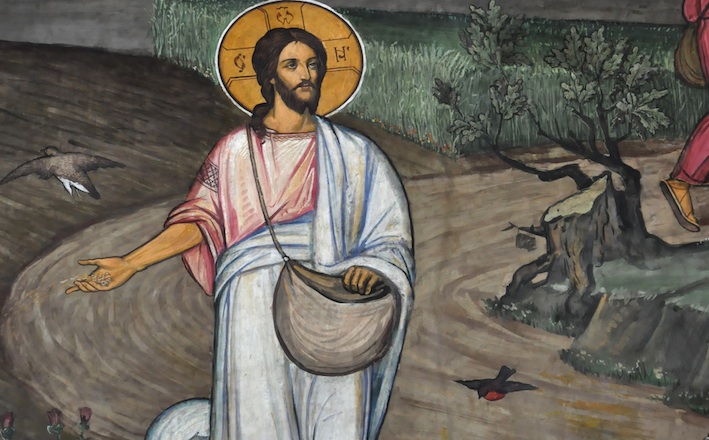Commentary on Isaiah 55:10-13
These last few verses of Isaiah 55 offer an image of new creation with the natural world serving as a metaphor for the life-giving movement and effectiveness of the word of the Lord.
This passage is a foundation for understanding God’s relationship to Christian proclamation.
In the interest of the integrity of the text, reconsider the boundaries of this particular pericope. Insofar as the lectionary serves the church and not vice versa, consider including verses 6-9, which sets the stage what follows.
Israel is addressed with the invitation to seek the Lord, forsaking wicked ways and unrighteous thoughts (Isaiah 55:6-7a). Lest this be confused with morality, the text reaches past morality into the heart of the problem. Reminiscent of the First Commandment, the prophet’s hearers are encouraged to turn away from that which draws them away from the living God and toward death. As if floating just in the background, we can almost hear the beginning of Exodus 20: “I am the LORD your God, who brought you out of the land of Egypt, out of the house of slavery; you shall have no other gods before me” (Exodus 20:2-3). The Lord who delivered from the Israelites from Egypt is also the Lord who now delivers from Babylon.1
Yhwh, the God of return and pardon, invites repentance — a turning back toward the living God: “… let them return to the Lord, that he may have mercy on them, and to our God, for he will abundantly pardon” (Isaiah 55:7b).It is not that God’s people received something other than what their idolatry deserved; but more centrally it is that God’s mercy and pardon triumph over God’s wrath.
God’s expectation of complete devotion — you shall have no other gods before me! — is not softened. The emphasis, however, is shifted from judgment to mercy — from the human turning away toward other gods toward the Lord’s resilient, merciful refusal to turn away from the Lord’s people.
Verses 8-9 serve to put things into proper perspective: “For my thoughts are not your thoughts, nor are your ways my ways,… For as the heavens are higher than the earth, so are my ways higher than your ways and my thoughts than your thoughts” (Isaiah 55:8-9).
Lest the hearer get tangled up in a lack of role clarity, the Lord is the Lord, maker of heaven and earth (cf. Isaiah 40:12ff), and the hearer is not. This is not to downplay the importance of any individual or humanity in general. It is, rather, to put things into proper perspective, because what comes next depends on this role clarity.
“For as the rain and the snow come down from heaven, and do not return there until they have watered the earth, making it bring forth and sprout, giving seed to the sower and bread to the eater, so shall my word be that goes out from my mouth; it shall not return to me empty, but it shall accomplish that which I purpose, and succeed in the thing for which I sent it” (Isaiah 55:10-11).
Here the nature world illustrates the Lord’s wild claim. The heart of the image here is life. We are talking here about moisture — rain and snow that come down and water. The earth is not the life-giver in this illustration. It is the rain and snow, moisture from above, that causes the earth to burgeon, “giving seed to the sower and bread to the eater.” When the earth does not receive this moisture, life shrivels-up. What is green turns brown. Seeds do not sprout and grow. Ask any farmer, and she will tell you the importance of rain and snow to life.
And so the natural illustration turns towards its ultimate purpose: “So shall my word be that goes out from my mouth,” says Yhwh. This is not just a poetic, theological glimpse of the water cycle. This is about God’s word that gives life, that does what it is intended to do, that accomplishes, that succeeds in God’s purpose. This is God’s word that does not return empty.
Earlier in Deutero-Isaiah, it reads: “The grass withers, the flower fades; but the word of our God will stand for ever” (Isaiah 40:8). The power of the Word of God is not to be underestimated (Ecclesiastes 3:14). Yet, in a world that clamors for measurable results, how often do we preachers doubt the promise: “so shall my word be that goes out of my mouth”? How often do we want to give our hearers something to do beyond trusting in the promise?2
Consider the comments from Martin Luther (1483-1546) on Isaiah 55.10:
This paragraph is spoken in part for the confutation of the stubborn, in part for the consolation of the weak. For consolation, because the Word seems so weak and foolish that there appears to be no strength in it. How can it be believed that all the power, victory, and triumph of God are in the word of a feeble human mouth? And so He comes to meet this scandal of the weak and the stubborn. For all the enemies say, ‘Do you really thing that everything depends on the Word? We must act, work, and think.’ Here the text confounds their thoughts. He does not say, ‘Our works and our thoughts do this,’ but, ‘My Word.’ It is therefore a consolation for the purpose of listing up the weak, lest they be offended at the lowliness of God, who has every victory in His Word.
At the same time He provides an illustration: As they come down. Rain and snow are not useless, but they water the earth, giving seed to the sower. The rain can achieve everything for the earth. ‘So also My Word accomplishes everything.’ The effect is the same. For neither one is understood. Reason says, ‘The strength belongs not to the rain and snow but to the earth.’ But when we experience the absence of rain, we see what the earth produces. So He takes away the glory of the earth and shows that it is not the earth that does it but that it is accomplished by the rain. So our building and promotion of the church is not the result of our works but of the Word of God which we preach… Here you see that everything is produced by the Word.3
The Word (now deliberately capitalized within the horizon of Christian proclamation) of God accomplishes what God purposes — repentance, faith, and salvation. Christian proclamation participates in this work of God. We don’t add to this work or validate it or accomplish it. This is God’s work done by way of God’s Word proclaimed.
“For you shall go out in joy, and be led forth in peace; the mountains and the hills before you shall break forth into singing, and all the trees of the field shall clap their hands.”4 So wild is the promise and work of God’s Word.
Notes:
1 Cf. Isaiah 40:1-10.
2 Recall Romans 10:17.
3 Martin Luther, Lectures on Isaiah: Chapters 40-66 (Luther’s Works, 17; Saint Louis: Concordia, 1972) 257-258.
4 Isaiah 55, what Claus Westermann called the “epilogue”to Deutero-Isaiah, cf. Isaiah 40-66 (OTL; Philadelphia: Westminster, 1969) 286.


July 13, 2014